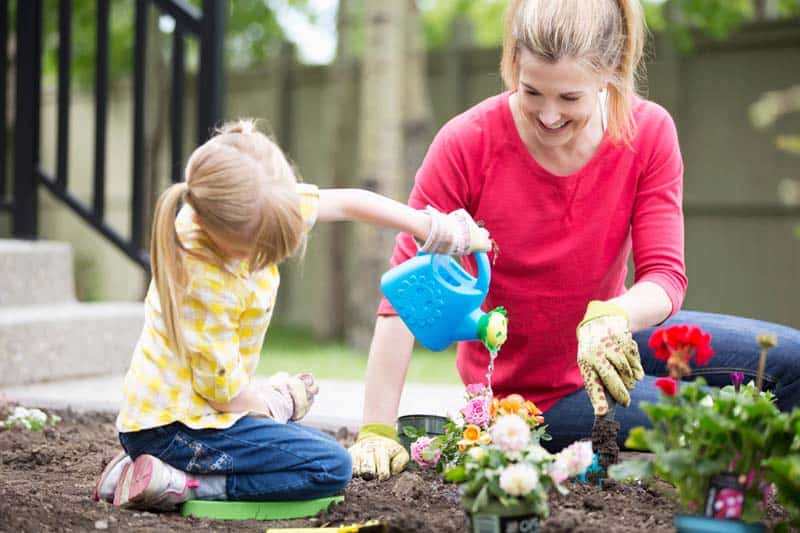Have You Considered Taking Time to Play with Your Child Today? It’s Simple!
When was the last time you played? Where you rolled around on the floor, played make-believe, collected random treasure from outside, created abstract art, and laughed until your belly hurt? Those days of the past can still be the days of your today and tomorrow. Take a few moments to observe your child as they play and get on their level to join in on the fun. While you get a small break from “adulting,” your playtime interaction with your child is supporting healthy brain development and influences who they’ll become.
Children learn through play in their early years. This simple pastime is a crucial part of their development; 90% of a child’s brain will be fully developed by age 5. Play also helps develop important skills for their educational journey, such as when they start voluntary preschool (VPK).
You may wonder how exactly you can make playtime meaningful? Start by focusing on each of the five learning domains for five minutes each day. The five learning domains include Literacy, Social-Emotional Skills, Gross Motor Skills, Social Studies and STEM (science, technology, engineering, and mathematics). All of this can easily be included into your daily routine with your child, so let's get started.
Literacy
Reading to your child is one of the most important activities you can do with your child. Not only are you bonding with your little one, but literacy fuels all the other learning domains. Get creative with reading locations. Maybe it’s in a blanket fort you create together, in your favorite rocking chair or outside under a tree. Point to the words as you read so your child can connect the words with the pronunciation of each one. Look over the storybook pictures and talk about what is happening in them. At the end of the storybook, work with your child on recapping the story. All of this helps them improve their reading comprehension skills.
Social-Emotional Skills
This domain is about understanding emotions, relationship building and problem-solving. You could play a collaborative board game, have a block tower-building contest or create an obstacle course in your home. The goal is to give your child healthy challenges and help them regulate their emotions throughout the process. If they feel sad because the block tower toppled over, have a conversation about why it upset them and give them tools to calm themselves down, like taking deep breaths, or give advice on how they can attempt to build the tower the next time around. This is an opportunity for you as their caregiver to demonstrate words of encouragement and help your child navigate how to overcome challenges because, as we all know, “adulting” is full of challenges.
Gross Motor Skills
This is a great way to incorporate physical activity and burn off the abundance of energy your child has while strengthening their muscle coordination. Have a “late night” dance party on a Friday night in your home, practice yoga in the park, get out the sidewalk chalk and play hopscotch, or have a running contest. The possibilities are endless; it’s a great time to breathe in fresh air with this domain or practice their small motor skills on a rainy day.
Social Studies
With this domain in your child’s early years, you are teaching them about the world and how they interact within it. It's a wonderful time to discuss family traditions and make a family tree where they can draw members of their family. You can even take this one on the road with you and point out road signs on a drive and explain why it's important to follow the rules. Introduce what it means to be a community helper and walk around your neighborhood and do cleanup.
STEM
This is focusing on problem-solving skills, asking questions and exploring. Practice basic numeracy skills by counting out items in the kitchen like goldfish crackers and show how many remain after they eat two. Take a trip to the garden and have your child help water the plants and talk about the different outcomes of watering verses not watering the plants. You can collect rocks and talk about the color, texture, and patterns, and take it a step further by asking questions like, “Do you think the rock will sink or float?” You’re encouraging them to make educated guesses and observe an outcome.
Playtime with your child is full of endless possibilities and it doesn’t take much time or money. We know you have a busy schedule, so we encourage you to try to focus on one domain a day. Taking the time to play with your child is creating positive memories for both of you. Enrolling your child in a VPK program is also a great way to enhance the five learning domains to better prepare your child for their educational journey.
To learn more about how to incorporate the five domains into playtime or enroll into a VPK program, contact the Early Learning Coalition of Hillsborough County at www.elchc.org.
“Children learn as they play. More importantly, in play, children learn how to learn.” – O. Fred Donaldson
*Presented by Early Learning Coalition of Hillsborough County. Photo by Hero Images. | Originally published in the March 2023 issue of Tampa Bay Parenting Magazine.


